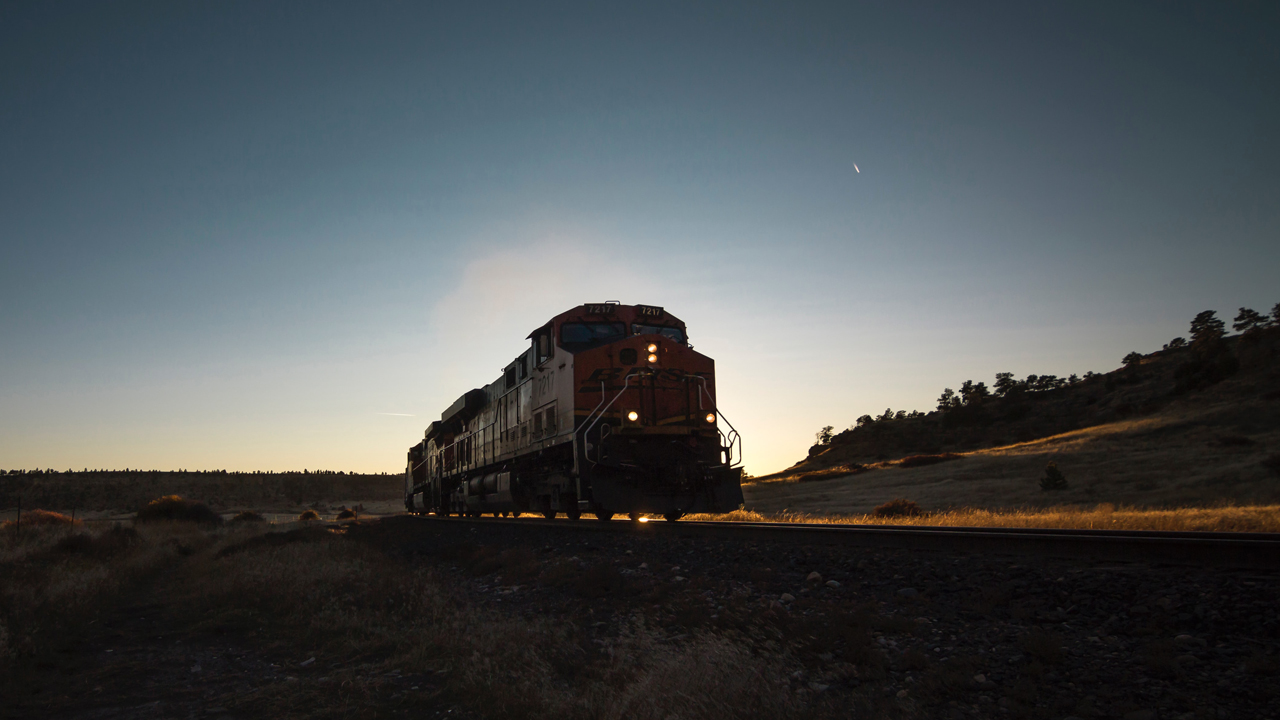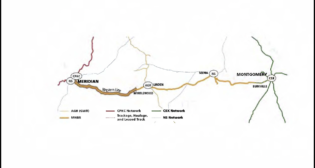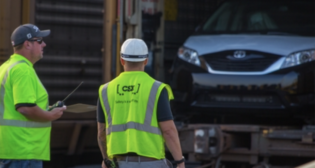
Industry Groups Urge EPA to Deny CARB Rule
Written by Marybeth Luczak, Executive Editor
(Steve Halama, Unsplash)
Industry groups are calling on the U.S. Environmental Protection Agency (EPA) to reject an authorization request from the California Air Resources Board (CARB) to implement a regulation that was finalized last year, banning any locomotive that is 23 years or older from operating in California starting in 2030 and requiring that new locomotives only operate in the state if they are “zero-emissions locomotives,” beginning in 2030 for switch, industrial, and passenger locomotives and 2035 for line haul locomotives.
The Association of American Railroads (AAR), along with the American Short Line and Regional Railroad Association (ASLRRA) and the California Short Line Railroad Association (CSLRA), were among those submitting comments to the EPA by the April 22 deadline. The Surface Transportation Board (STB) also filed comments to explain its jurisdiction over interstate rail transportation and “how the broad preemption provision in the Interstate Commerce Act (as amended), 49 U.S.C. § 10501(b), could impact the EPA’s decision” (scroll down to download).
The AAR and ASLRRA last year filed a lawsuit, on behalf of their members, against CARB, challenging the rule, which they said “would limit the useful life of today’s locomotive fleet (more than 25,000 locomotives) and mandate their premature replacement with zero-emissions locomotives.”
“Railroads continue to invest billions to reduce their environmental impact, a major reason why carriers contribute less than one percent of all U.S. greenhouse gas (GHG) emissions,” said Ian Jefferies, President and CEO of the Association of American Railroads in an April 24 statement. “Yet California insists on using unreasonable, flawed assumptions to support a rule that will not result in emissions reductions. AAR and its members present a clear and compelling set of facts to the EPA, and we are joined by a wide range of our customers and other critical stakeholders who underscore the myriad negative impacts associated with the rule. We urge the Biden administration to heed these calls and make the right choice, putting rail on a better and more logical path to continued emissions reductions.”
AAR’s comments (download below) include these arguments:
- “Complying with the regulation’s timeline is impossible given the current state of research and development into zero emissions locomotive technology.
- “Because of the interstate nature of railroad operations, California’s regulation amounts to a national rule. For critical reasons, including protection of the healthy and efficient flow of national commerce, regulation of the national rail network is a federal matter, and no single state should set policy for the entire nation. Both the Clean Air Act and the Interstate Commerce Commission Termination Act of 1995 bar California from taking this action.”
ASLRRA and CSLRA in their joint comments (download below) urged the EPA to deny CARB’s authorization request as “CARB has not met the criteria under federal law to warrant the EPA authorization CARB seeks.”
The associations pointed out that:
- “CARB’s request conflicts with the requirements of the Clean Air Act.
- “CARB’s proposed standards are arbitrary and capricious.
- “CARB’s regulation is unwarranted and unnecessary to address assertedly compelling and extraordinary conditions in California.
- “CARB’s regulation does not conform with CAA section 209.
- “CARB’s petition has national implications for short line railroads.”
The associations further asserted that “CARB has ignored the input and economic realities of the 25 short line railroads in the State of California. The associations actively participated in CARB’s rulemaking process from its inception in 2022, tendering numerous comments and in-person testimony along the way. In so doing, ASLRRA presented profound concerns about the proposed regulation, its legality, its impact on interstate commerce, and the extraordinary costs of the proposed regulation’s unfunded mandate, pointing out in the process that the regulations CARB had in mind would doubtlessly force many short lines in California out of business. CSLRA also registered its deep concern about CARB’s draconian, anti-railroad perspective through the same comment processes, as did numerous individual short lines, shippers and shipper organizations, Class I railroads, and the Association of American Railroads.”
AAR on April 24 provided a review of other public comments opposing the authorization request:
- “Organized labor, such as ironworkers, pipe trades, engineers and conductors documented the negative effect on jobs and the economy.
- “A coalition of more than 25 national agricultural organizations and more than 50 state agricultural groups from across the country, representing all portions of production—from fertilizers to commodities—discussed the effect on rail service and getting goods to market.
- “The U.S. Chamber of Commerce and more than 130 state and local chambers stressed economic harm. Additionally, 206 state-based business organizations signed a letter filed by the Illinois Manufacturers Association.
- “A group of major U.S. industries, led by the National Association of Manufacturers and representing the gamut of the economy—trucking, retailers, builders, contractors, beer, wholesalers, food companies, warehousing, lumber, paper, wood, plastics, fuel providers, fuel stations and a range of energy sources—argued the rule would hurt millions of Americans.
- “The Rail Customer Coalition (RCC), representing industries tied closely to the viability of reliable rail transportation, filed on behalf of roughly 75 national and state organizations. Industries represented included manufacturing, agricultural, and energy—including the cross-section of chemical companies responsible for U.S. energy dominance.
- “The ‘Joint Associations’—some of the largest users of freight rail—including the Private Railcar Food and Beverage Association, American Forest and Paper Association, Consumer Brands Association, Freight Rail Customer Alliance, National Coal Transportation Association, National Industrial Transportation League, and Western Coal Traffic League —voiced grave concern.
- “Leaders from states across the country, including Ohio, California, Utah, Kentucky, New York, Missouri, Minnesota, Arizona, Illinois, Mississippi, Florida, Wisconsin, Georgia, Michigan, Oklahoma, North Carolina, West Virginia, Oregon, New Jersey, Virginia, Tennessee, Nevada, Louisiana, Texas, Pennsylvania, Washington and Indiana, also weighed in.
- “Downstream, county advocates—through representation in Washington, D.C.—argued that the regulation will divert freight to strained highway systems while running afoul of a more appropriate approach coordinated between federal, state and local governments.
- “Individual subject matter experts at institutions such as the American Enterprise Institute, Center for Regulatory Freedom, George Washington University, Heritage Foundation and Reason Foundation offered analysis, while a large coalition of policy organizations filed collectively at the EPA.
- “Environmental advocates at the American Conservation Coalition, C3 Solutions and ConservAmerica argued that the rule will have counterproductive results in terms of emissions reductions. At the same time, consumer advocates argued the rule would raise costs by picking winners and losers and fail to meet long-term consumer needs.
- “And, industries such as defense, rail suppliers, fuel and petrochemical manufacturers, and biofuels outlined the negative effects to their critical sectors.”
Policymakers also weighed in. According to AAR, this includes a letter from U.S. Senators Pete Ricketts (R-Neb.), Shelley Moore Capito (R-W.Va.), Joe Manchin (D-W.Va.), John Boozman (R-Ark.), Mike Braun (R-Ind.), Kevin Cramer (R-N.Dak.), Joni Ernst (R-Iowa), Deb Fischer (R-Neb.), John Hoeven (R-N.Dak.), Cynthia Lummis (R-Wyo.), Roger Marshall (R-Kans.), and Roger Wicker (R-Miss.). Most recently, AAR said, the majority of the House Transportation & Infrastructure Committee asserted their authority in this area.
Additionally, the U.S. Small Business Administration Office of Advocacy emphasized “the disproportionate harm the CARB rule would have on short line railroads, including the ability to put many out of business,” according to AAR.
“Taken together, the public record reflects wide-reaching opposition to this misguided California rule,” Jefferies concluded. “We look forward to future discussions with the EPA to reinforce our public comments.”
AAR reported that the rule remains the subject of litigation in California, and that the EPA is not obligated to rule on the authorization request and is not bound by a deadline.
Additional comments filed at the EPA should appear publicly in the future.
DOWNLOAD STB COMMENTS:
Further Reading:
New EPA Rule Will No Longer ‘Categorically Preempt’ State Locomotive Regs



![“This record growth [in fiscal year 2024’s third quarter] is a direct result of our innovative logistic solutions during supply chain disruptions as shippers focus on diversifying their trade lanes,” Port NOLA President and CEO and New Orleans Public Belt (NOPB) CEO Brandy D. Christian said during a May 2 announcement (Port NOLA Photograph)](https://www.railwayage.com/wp-content/uploads/2024/05/portnola-315x168.png)